2012 Hyundai Sonata washer fluid
[x] Cancel search: washer fluidPage 319 of 411
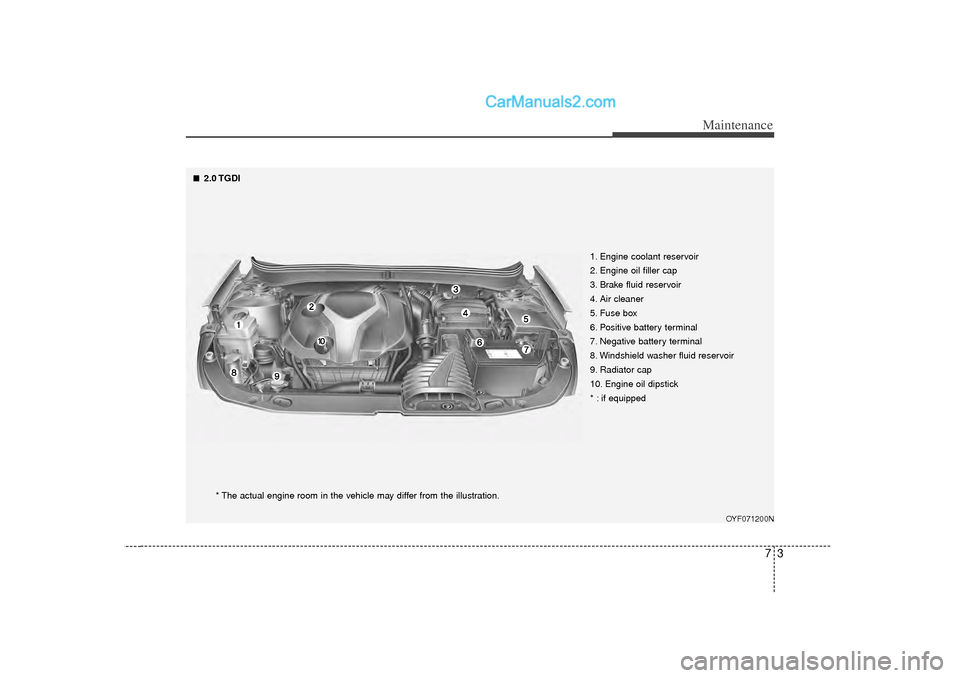
73
Maintenance
1. Engine coolant reservoir
2. Engine oil filler cap
3. Brake fluid reservoir
4. Air cleaner
5. Fuse box
6. Positive battery terminal
7. Negative battery terminal
8. Windshield washer fluid reservoir
9. Radiator cap
10. Engine oil dipstick
* : if equipped
OYF071200N
* The actual engine room in the vehicle may differ from the illustration.
■
■
2.0 TGDI
Page 321 of 411
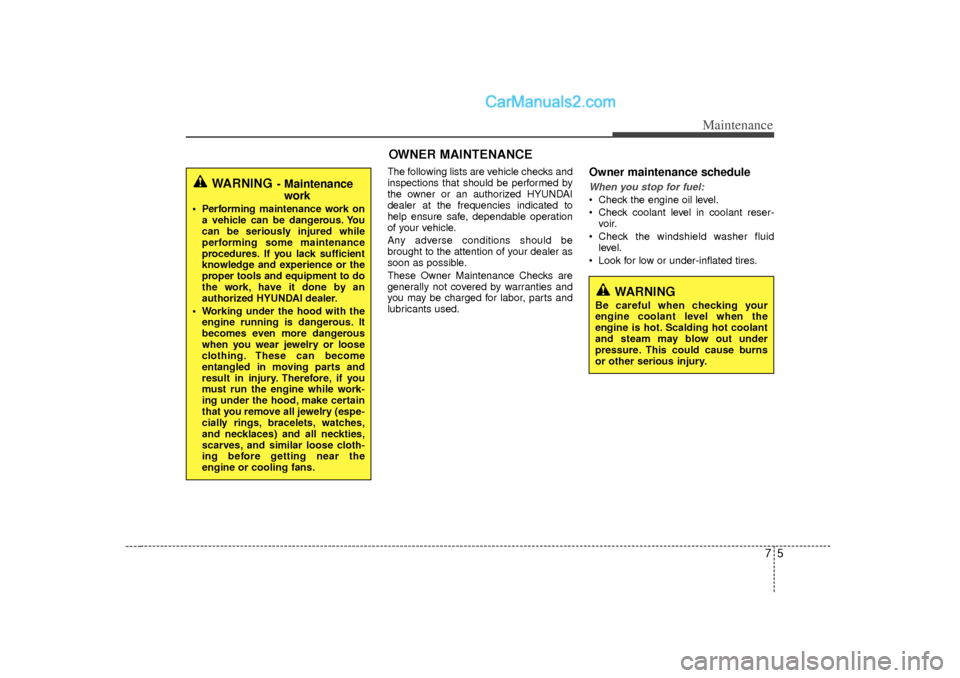
75
Maintenance
The following lists are vehicle checks and
inspections that should be performed by
the owner or an authorized HYUNDAI
dealer at the frequencies indicated to
help ensure safe, dependable operation
of your vehicle.
Any adverse conditions should be
brought to the attention of your dealer as
soon as possible.
These Owner Maintenance Checks are
generally not covered by warranties and
you may be charged for labor, parts and
lubricants used.
Owner maintenance schedule When you stop for fuel: Check the engine oil level.
Check coolant level in coolant reser-voir.
Check the windshield washer fluid level.
Look for low or under-inflated tires.
WARNING
- Maintenance work
Performing maintenance work on
a vehicle can be dangerous. You
can be seriously injured while
performing some maintenance
procedures. If you lack sufficient
knowledge and experience or the
proper tools and equipment to do
the work, have it done by an
authorized HYUNDAI dealer.
Working under the hood with the engine running is dangerous. It
becomes even more dangerous
when you wear jewelry or loose
clothing. These can become
entangled in moving parts and
result in injury. Therefore, if you
must run the engine while work-
ing under the hood, make certain
that you remove all jewelry (espe-
cially rings, bracelets, watches,
and necklaces) and all neckties,
scarves, and similar loose cloth-
ing before getting near the
engine or cooling fans.
OWNER MAINTENANCE
WARNING
Be careful when checking your
engine coolant level when the
engine is hot. Scalding hot coolant
and steam may blow out under
pressure. This could cause burns
or other serious injury.
Page 322 of 411
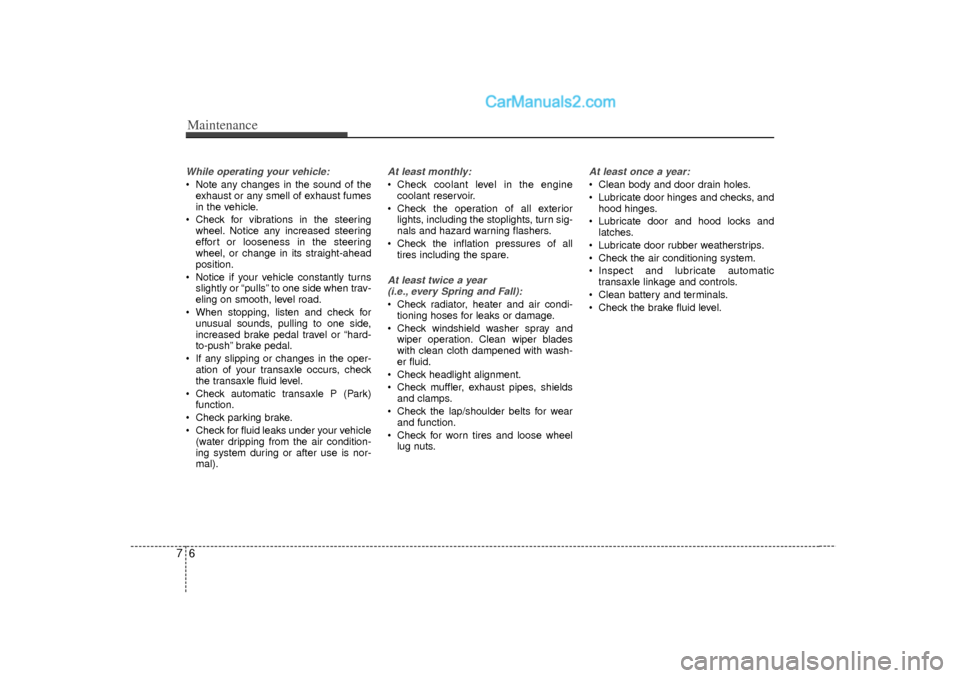
Maintenance67While operating your vehicle: Note any changes in the sound of theexhaust or any smell of exhaust fumes
in the vehicle.
Check for vibrations in the steering wheel. Notice any increased steering
effort or looseness in the steering
wheel, or change in its straight-ahead
position.
Notice if your vehicle constantly turns slightly or “pulls” to one side when trav-
eling on smooth, level road.
When stopping, listen and check for unusual sounds, pulling to one side,
increased brake pedal travel or “hard-
to-push” brake pedal.
If any slipping or changes in the oper- ation of your transaxle occurs, check
the transaxle fluid level.
Check automatic transaxle P (Park) function.
Check parking brake.
Check for fluid leaks under your vehicle (water dripping from the air condition-
ing system during or after use is nor-
mal).
At least monthly: Check coolant level in the enginecoolant reservoir.
Check the operation of all exterior lights, including the stoplights, turn sig-
nals and hazard warning flashers.
Check the inflation pressures of all tires including the spare.At least twice a year (i.e., every Spring and Fall): Check radiator, heater and air condi- tioning hoses for leaks or damage.
Check windshield washer spray and wiper operation. Clean wiper blades
with clean cloth dampened with wash-
er fluid.
Check headlight alignment.
Check muffler, exhaust pipes, shields and clamps.
Check the lap/shoulder belts for wear and function.
Check for worn tires and loose wheel lug nuts.
At least once a year: Clean body and door drain holes.
Lubricate door hinges and checks, andhood hinges.
Lubricate door and hood locks and latches.
Lubricate door rubber weatherstrips.
Check the air conditioning system.
Inspect and lubricate automatic transaxle linkage and controls.
Clean battery and terminals.
Check the brake fluid level.
Page 342 of 411
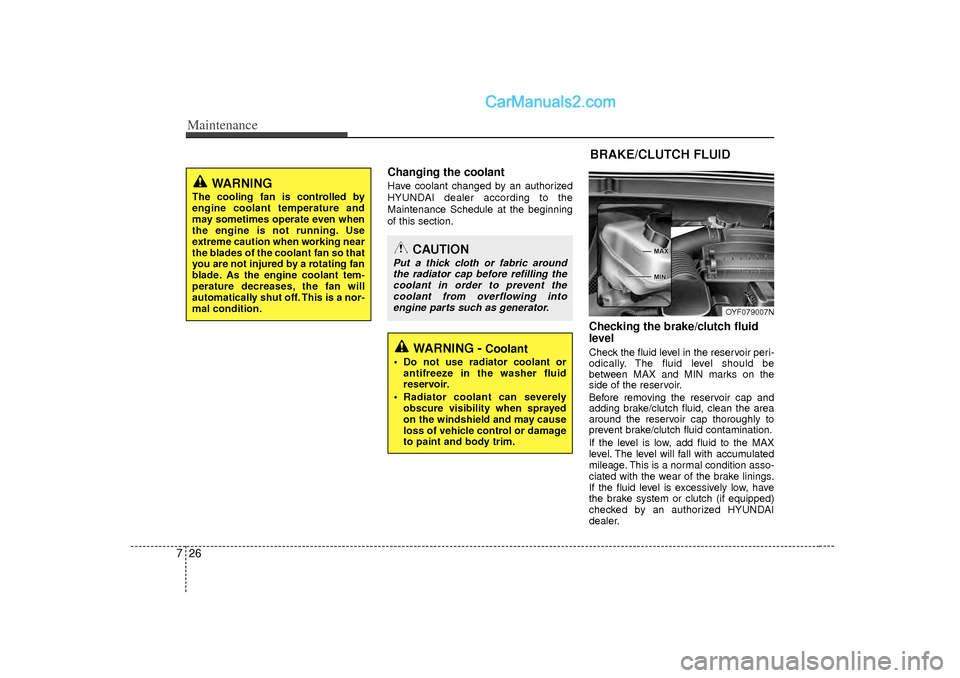
Maintenance26
7
Changing the coolantHave coolant changed by an authorized
HYUNDAI dealer according to the
Maintenance Schedule at the beginning
of this section.
Checking the brake/clutch fluid
level Check the fluid level in the reservoir peri-
odically. The fluid level should be
between MAX and MIN marks on the
side of the reservoir.
Before removing the reservoir cap and
adding brake/clutch fluid, clean the area
around the reservoir cap thoroughly to
prevent brake/clutch fluid contamination.
If the level is low, add fluid to the MAX
level. The level will fall with accumulated
mileage. This is a normal condition asso-
ciated with the wear of the brake linings.
If the fluid level is excessively low, have
the brake system or clutch (if equipped)
checked by an authorized HYUNDAI
dealer.
OYF079007N
BRAKE/CLUTCH FLUID
WARNING -
Coolant
Do not use radiator coolant or
antifreeze in the washer fluid
reservoir.
Radiator coolant can severely obscure visibility when sprayed
on the windshield and may cause
loss of vehicle control or damage
to paint and body trim.
CAUTION
Put a thick cloth or fabric aroundthe radiator cap before refilling thecoolant in order to prevent the coolant from overflowing intoengine parts such as generator.
WARNING
The cooling fan is controlled by
engine coolant temperature and
may sometimes operate even when
the engine is not running. Use
extreme caution when working near
the blades of the coolant fan so that
you are not injured by a rotating fan
blade. As the engine coolant tem-
perature decreases, the fan will
automatically shut off. This is a nor-
mal condition.
Page 343 of 411
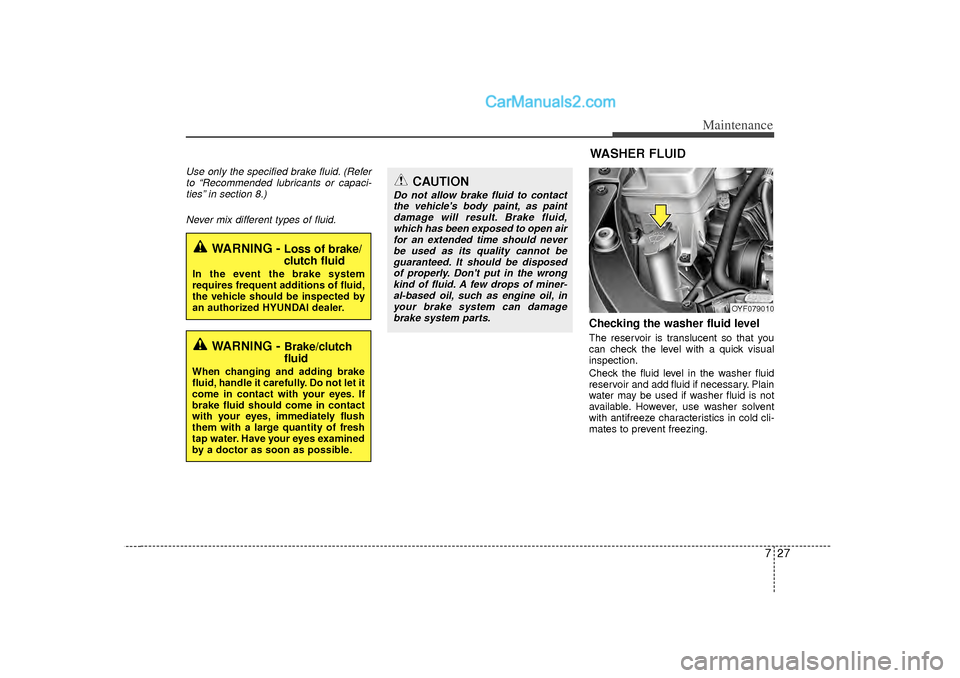
727
Maintenance
Use only the specified brake fluid. (Referto “Recommended lubricants or capaci-ties” in section 8.)
Never mix different types of fluid.
Checking the washer fluid level The reservoir is translucent so that you
can check the level with a quick visual
inspection.
Check the fluid level in the washer fluid
reservoir and add fluid if necessary. Plain
water may be used if washer fluid is not
available. However, use washer solvent
with antifreeze characteristics in cold cli-
mates to prevent freezing.
OYF079010
WARNING -
Brake/clutch
fluid
When changing and adding brake
fluid, handle it carefully. Do not let it
come in contact with your eyes. If
brake fluid should come in contact
with your eyes, immediately flush
them with a large quantity of fresh
tap water. Have your eyes examined
by a doctor as soon as possible.
WARNING -
Loss of brake/
clutch fluid
In the event the brake system
requires frequent additions of fluid,
the vehicle should be inspected by
an authorized HYUNDAI dealer.
CAUTION
Do not allow brake fluid to contactthe vehicle's body paint, as paintdamage will result. Brake fluid,which has been exposed to open air for an extended time should neverbe used as its quality cannot beguaranteed. It should be disposedof properly. Don't put in the wrong kind of fluid. A few drops of miner-al-based oil, such as engine oil, inyour brake system can damage brake system parts.
WASHER FLUID
Page 344 of 411
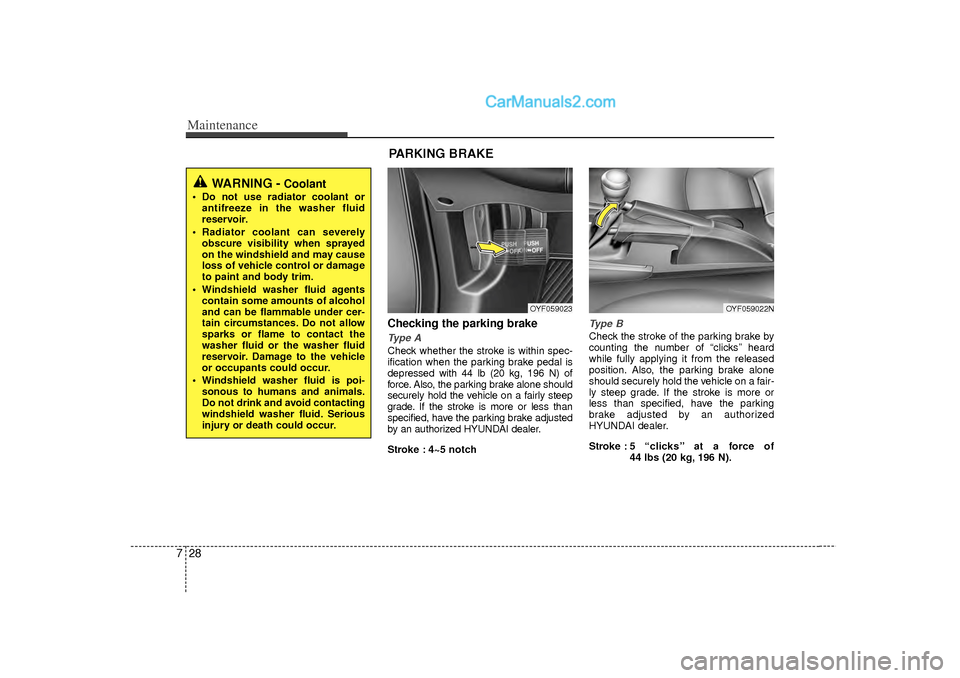
Maintenance28
7
Checking the parking brakeType ACheck whether the stroke is within spec-
ification when the parking brake pedal is
depressed with 44 lb (20 kg, 196 N) of
force. Also, the parking brake alone should
securely hold the vehicle on a fairly steep
grade. If the stroke is more or less than
specified, have the parking brake adjusted
by an authorized HYUNDAI dealer.
Stroke : 4~5 notch
Type BCheck the stroke of the parking brake by
counting the number of “clicks’’ heard
while fully applying it from the released
position. Also, the parking brake alone
should securely hold the vehicle on a fair-
ly steep grade. If the stroke is more or
less than specified, have the parking
brake adjusted by an authorized
HYUNDAI dealer.
Stroke : 5 “clicks’’ at a force of
44 lbs (20 kg, 196 N).
OYF059023
OYF059022N
WARNING -
Coolant
Do not use radiator coolant orantifreeze in the washer fluid
reservoir.
Radiator coolant can severely obscure visibility when sprayed
on the windshield and may cause
loss of vehicle control or damage
to paint and body trim.
Windshield washer fluid agents contain some amounts of alcohol
and can be flammable under cer-
tain circumstances. Do not allow
sparks or flame to contact the
washer fluid or the washer fluid
reservoir. Damage to the vehicle
or occupants could occur.
Windshield washer fluid is poi- sonous to humans and animals.
Do not drink and avoid contacting
windshield washer fluid. Serious
injury or death could occur.
PARKING BRAKE
Page 405 of 411
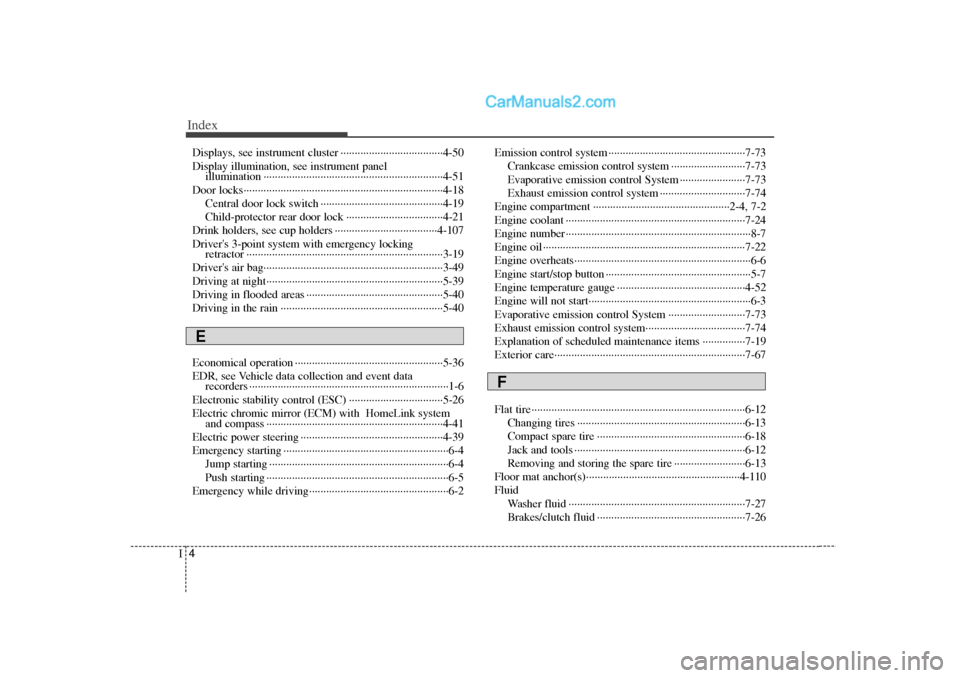
Index4I
Displays, see instrument cluster ··················\
··················\
4-50
Display illumination, see instrument panelillumination ··················\
··················\
··················\
·········4-51
Door locks··················\
··················\
··················\
················4-18 Central door lock switch ··················\
··················\
·······4-19
Child-protector rear door lock ··················\
················4-21
Drink holders, see cup holders ··················\
··················\
4-107
Driver's 3-point system with emergency locking retractor ··················\
··················\
··················\
···············3-19
Driver's air bag··············\
··················\
··················\
·············3-49
Driving at night··················\
··················\
··················\
········5-39
Driving in flooded areas ··················\
··················\
············5-40
Driving in the rain ··················\
··················\
··················\
···5-40
Economical operation ··················\
··················\
················5-36
EDR, see Vehicle data collection and event data recorders ··················\
··················\
··················\
················1-6
Electronic stability control (ESC) ··················\
···············5-26
Electric chromic mirror (ECM) with HomeLink system and compass ··················\
··················\
··················\
········4-41
Electric power steering ··················\
··················\
··············4-39
Emergency starting ··················\
··················\
··················\
····6-4 Jump starting ··················\
··················\
··················\
·········6-4
Push starting ··················\
··················\
··················\
··········6-5
Emergency while driving··················\
··················\
·············6-2 Emission control system ··················\
··················\
············7-73
Crankcase emission control system ··················\
········7-73
Evaporative emission control System ··················\
·····7-73
Exhaust emission control system ··················\
············7-74
Engine compartment ··················\
··················\
············2-4, 7-2
Engine coolant ··················\
··················\
··················\
·········7-24
Engine number ··················\
··················\
··················\
···········8-7
Engine oil ··················\
··················\
··················\
·················7-22\
Engine overheats··················\
··················\
··················\
········6-6
Engine start/stop button ··················\
··················\
···············5-7
Engine temperature gauge ··················\
··················\
·········4-52
Engine will not start··················\
··················\
··················\
···6-3
Evaporative emission control System ··················\
·········7-73
Exhaust emission control system··················\
·················7-74\
Explanation of scheduled maintenance items ···············7-19
Exterior care··················\
··················\
··················\
·············7-67
Flat tire ··················\
··················\
··················\
··················\
···6-12 Changing tires ··················\
··················\
··················\
·····6-13
Compact spare tire ··················\
··················\
················6-18
Jack and tools ··················\
··················\
··················\
······6-12
Removing and storing the spare tire ··················\
·······6-13
Floor mat anchor(s)··················\
··················\
··················\
4-110
Fluid Washer fluid ··················\
··················\
··················\
········7-27
Brakes/clutch fluid ··················\
··················\
················7-26E
F
Page 411 of 411
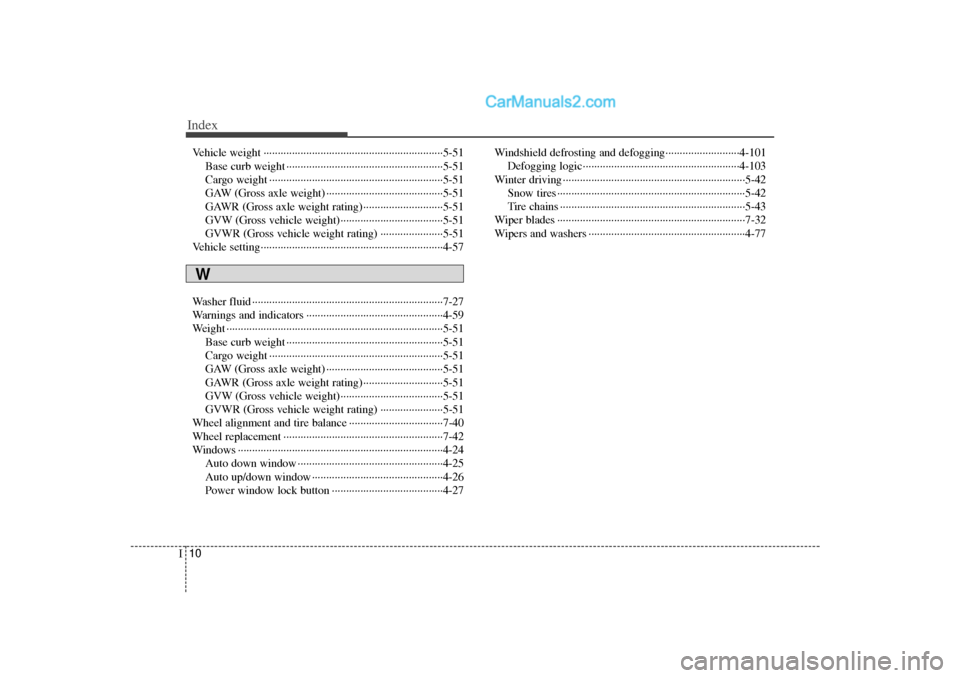
Index10I
Vehicle weight ··················\
··················\
··················\
·········5-51Base curb weight ··················\
··················\
··················\
·5-51
Cargo weight ··················\
··················\
··················\
·······5-51
GAW (Gross axle weight) ··················\
··················\
·····5-51
GAWR (Gross axle weight rating)··················\
··········5-51
GVW (Gross vehicle weight)··················\
··················\
5-51
GVWR (Gross vehicle weight rating) ··················\
····5-51
Vehicle setting··················\
··················\
··················\
··········4-57
Washer fluid ··················\
··················\
··················\
·············7-27
Warnings and indicators ··················\
··················\
············4-59
Weight ··················\
··················\
··················\
··················\
····5-51 Base curb weight ··················\
··················\
··················\
·5-51
Cargo weight ··················\
··················\
··················\
·······5-51
GAW (Gross axle weight) ··················\
··················\
·····5-51
GAWR (Gross axle weight rating)··················\
··········5-51
GVW (Gross vehicle weight)··················\
··················\
5-51
GVWR (Gross vehicle weight rating) ··················\
····5-51
Wheel alignment and tire balance ··················\
···············7-40
Wheel replacement ··················\
··················\
··················\
··7-42
Windows ··················\
··················\
··················\
··················\
4-24 Auto down window ··················\
··················\
···············4-25
Auto up/down window ··················\
··················\
··········4-26
Power window lock button ··················\
··················\
···4-27 Windshield defrosting and defogging··················\
········4-101
Defogging logic··················\
··················\
··················\
·4-103
Winter driving ··················\
··················\
··················\
··········5-42 Snow tires ··················\
··················\
··················\
············5-42
Tire chains ··················\
··················\
··················\
···········5-43
Wiper blades ··················\
··················\
··················\
············7-32
Wipers and washers ··················\
··················\
··················\
·4-77W